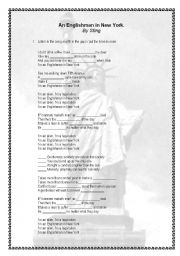

In a review of musical novelties of the season, Sergei Prokofiev described it as full of "superior melodies, very well designed, harmonically beautiful and not too 'modernist'." Prokofiev was as impressed with the young talent as Diaghilev was, and soon the composers became close friends. Dukelsky's first theatrical production, Zephyr and Flora, was staged in the 1925 season of Ballets Russes, with choreography by Léonide Massine and scenography by Georges Braque, to great critical acclaim. In Paris, he received a commission from Serge Diaghilev to compose a ballet. Dukelsky's first songs published under his pen name were conceived that year, but he continued to write classical music and Russian poetry under his birth name until 1955. Gershwin (born Jacob Gershwine) suggested that Dukelsky truncate and Americanize his surname, taking Vernon as his given name. In 1922 in New York, George Gershwin befriended the young immigrant. On the passenger list, the purser of the King Alexander recorded his name as Vladimir Doukelsky, in the French fashion. He underwent his immigration inspection at Ellis Island. In 1921, they obtained American visas and sailed steerage class on the SS King Alexander to New York. In 1919, his family escaped from the turmoil of civil war in Russia and spent a year and a half with other refugees in Constantinople. Petersburg, directed by Vsevolod Pudovkin.Īt the age of eleven, Dukelsky was admitted to the Kiev Conservatory, where he studied composition with Reinhold Glière and musical theory with Boleslav Yavorsky. The title is a reference to the film The End of St. The impressions of that summer were later echoed in Dukelsky's oratorio The End of St. The Dukelskys resided in Kiev, and Vladimir's only visit to Saint Petersburg and Moscow occurred in the summer of 1915.

The Jewish Standard lists him among Jewish musicians, for reasons unknown Composer Jack Gottlieb denies this claim. According to Duke, his mother also had some Austrian and Spanish ancestry. His family was of the small gentry class the 1954 Grove's Dictionary of Music and Musicians referred to his paternal grandmother, née Princess Tumanishvili, as having been "directly descended from the kings of Georgia".

Vladimir Aleksandrovich Dukelsky ( Russian: Владимир Александрович Дукельский) was born in 1903 into a Belarusian noble family in the village of Parfyanovka, Pskov Governorate, Russian Empire. He wrote the words and music for " Autumn in New York" (1934) for the revue Thumbs Up! In his book, American Popular Song, The Great Innovators 1900-1950, composer Alec Wilder praises this song, writing, “The verse may be the most ambitious I’ve ever seen." Duke also collaborated with lyricists Johnny Mercer, Ogden Nash, and Sammy Cahn. ("Yip") Harburg (1932), and "What Is There To Say," for the Ziegfeld Follies of 1934, also with Harburg. He is best known for " Taking a Chance on Love," with lyrics by Ted Fetter and John Latouche (1940), " I Can't Get Started," with lyrics by Ira Gershwin (1936), " April in Paris," with lyrics by E. The song was also recorded by Jo Stafford, and by Louis Armstrong and Ella Fitzgerald as a duet.Vernon Duke (10 October 1903 – 16 January 1969) was a Russian-born American composer/ songwriter who also wrote under his birth name, Vladimir Dukelsky. Jazz versions have been performed by The Hi Lo's, Charlie Parker, Billie Holiday, Bing Crosby, Mary Lou Williams, Stan Kenton, Sarah Vaughan, Sheila Jordan, Bill Evans, Tal Farlow, Ahmad Jamal, Buddy De Franco, Salvador Sobral, Al Haig, Diana Krall, and a duet version by Scottish singers Todd Gordon and Carol Kidd. The only version to achieve chart success as a single in the USA was that by Frank Sinatra, which reached No. Many versions of the song have been recorded over the years by numerous musicians and singers. The play opened on Decemwhere the song was performed by singer J. It was written without a commission or for a specific show, but Duke offered it to producer Murray Anderson for his Broadway musical Thumbs Up!.

"Autumn in New York" is a jazz standard and popular song composed by Vernon Duke in Westport, Connecticut in the summer of 1934.


 0 kommentar(er)
0 kommentar(er)
